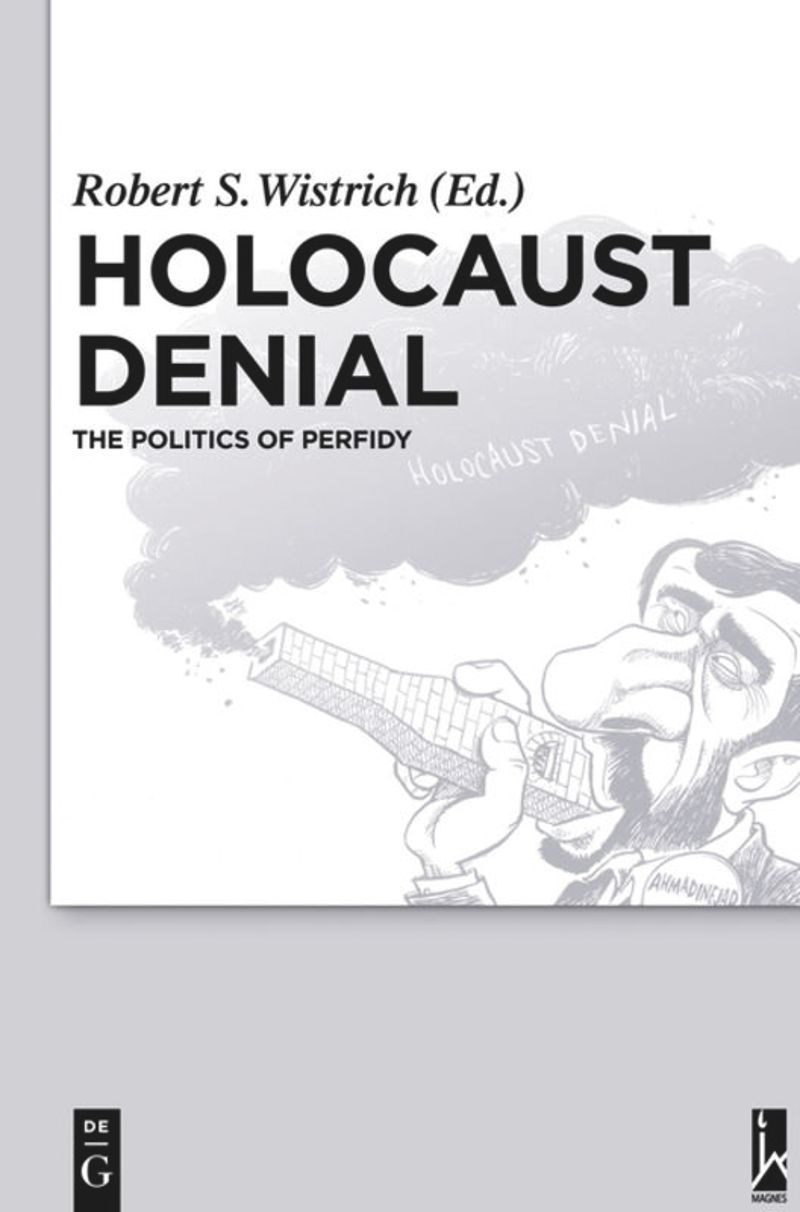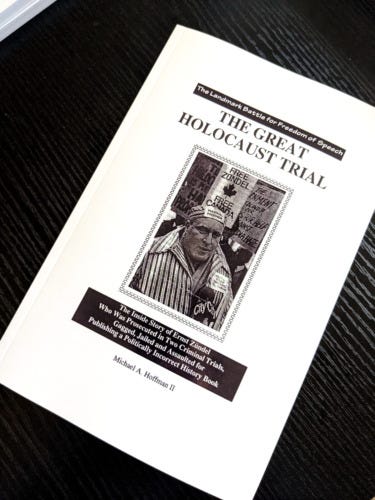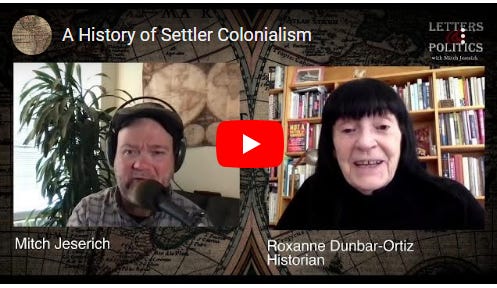Yes, yes,m Hall talks about lazy thinking when we use the term ‘nazi” to attack those folk like real neo-nzais or nationalist parties or Le Pen’s or even the IDF/IOF in Isra-Hell.
Aaron Mate says that what the Israeli Army and the Israeli politicians are doing and saying are nazi-like.
Usage of Nazi
Nazi in the extended sense of “a fanatical or domineering person” has existed at least since 1980 and parallels the use of the word police in the language police/the grammar police . Though this usage of Nazi is usually intended as jocular, it implies being intolerant of other people’s views and practices. And many people consider any extended use of the word Nazi to be offensive, in that it trivializes the terrible crimes of the German Nazis.
Hall and I talked about putting the actual facts and historical record of “that” Holocaust on trial. He was in Canada when one fellow was put on trial — Zundel.
We put a capstone on these interview by reminding our listeners that discussion is where we should be at NOW in all circles, and especially in academia. The death of the liberal class by Hedges says a lot about what has happened to liberal democracy, especially in education.
LINK>
Alain Goldschläger —[The author would like to thank Prof. Robert Wistrich for his editing work which greatly en-hanced the text; Alan Shefman, former director of the League of Human Rights of B’nai B’rith; and Adina Goldberg.]
The Trials of Ernst Zündel¹
The United Nations’ Conference on Racism, held in Durban in September 2001, was a sad reminder of the virulent antisemitism more readily associated with Europe in the 1930s. Speeches of free flowing hate, pictures borrowed from Nazi propaganda, and public insults were common. There was, of course, a modern touch: T-shirts with antisemitic slogans allowed people to wear their hatred on their chests. In the midst of bitter discussions, especially among the non-gov-ernmental organizations (NGOs), the subject of the Holocaust became central. Several attempts were made to trivialize, if not to deny the Holocaust. There were also proposals to use the word “Holocaust”as a generic term applicable to many other events—specifically, the equation of six hundred Palestinian deaths during first year of the second Intifada with the murder of six million Jews by the Nazis. This decontextualization of the Holocaust is not new; it is, rather, the latest effort in a trend that began in the early 1950s, immediatelyafter the initial shock wore off fromthe discovery of the death camps and the massacres perpetrated by the Nazis. In the recent past, the word “Holocaust” has been used by different groups to describe the mass deaths that have resulted from nuclear weapons or from the Cambodian and Rwandan genocides. If these uses of the word blur the ideology behind the Nazi atrocities, they at least preserve the horrific magnitude. However, the present efforts to equate Israel’s actions to the Holocaust grossly distort and trivialize history.
The Holocaust is a unique event that has marked not only Jewish conscious-ness, but also world history; it is the symbol for cruelty toward Jews. To equate other acts of genocide to it and to reduce it to the scope of a “normal” massacre is to denigrate its particularities and atrocities. If we wish to properly memorial-ize human suffering, then each act of genocide must be placed in its historical, social, and human context. Amalgamating all massacres into one category only denies the particular lessons in each of these events and, in the end, prevents humanity from learning the lessons of history.
Assaults against the memory of the Holocaust are no longer taboo.
+—+
Versus:
The Great Holocaust Trial: The Landmark Battle for the Right to Doubt the West's Most Sacred Relic
The record of the persecution of German-Canadian heretic Ernst Zundel by a de facto Sanhedrin, for publishing the book, 'Did Six Million Really Die?' is almost too fantastic to countenance. Zundel was prosecuted in Toronto under an archaic False News provision of an old Edwardian legal code. He faced two years in prison if convicted. In response, he put the so-called Holocaust' itself on trial.
Zundel's defense was initially regarded by the press and public as preposterous. How can anyone 'deny the Holocaust?' was the incredulous response to the news that Zundel would vigorously defend himself and the free speech rights of all Canadians. The trial was expected to be a quick and ignominious rout of Zundel and his supporters.
But in a startling reversal, the 'survivors' who had appeared in court in order to send him to jail, had to submit their testimony to scrutiny, the rules of evidence and cross-examination, something that had never happened before and has never happened since. Canadians grew ever more surprised and shocked at the amazing admissions which the defense team elicited from the supposed eyewitnesses to the homicidal gas chambers. As a result, television reporters and print journalists who covered the 1985 trial produced broadcasts and news reports that turned Canada upside down.
Zundel was tried again in 1988. This time he assembled the 'Leutcher Report,' an on-site forensic examination of Auschwitz by 'Mr. Death,' Fred Leutcher, capital punishment engineer for the U.S. prison system. When Zundel could not be silenced by the Canadian courts, his enemies turned to bombs, arson and the dungeons of Zionist Germany.In the face of relentless repression and vilification, Ernst Zundel continues to steadfastly maintain both his right to dissent and his dignity as a human being.
+—+
Hall and I covered colonialism versus settler colonialism. More references:
Guest:
Roxanne Dunbar-Ortiz grew up in rural Oklahoma in a tenant farming family. She has been active in the international Indigenous movement for more than 4 decades and is known for her lifelong commitment to national and international social justice issues. Dunbar-Ortiz is the winner of the 2017 Lannan Cultural Freedom Prize, she is the author or editor of many books, including An Indigenous Peoples’ History of the United States and her latest NOT “A NATION OF IMMIGRANTS” Settler Colonialism, White Supremacy, and a History of Erasure and Exclusion.
+—+
Cotinuation of Hall to me, his bio-blurb:
Together these agencies compose the most gargantuan system of defamation in the world. From where I sit, I can imagine the scale of the invasive attack on free speech and academic freedom underway from the Israel Lobby that now is denying what is happening in Gaza constitutes genocide. I'm glad to have this current opportunity to talk about my experiential learning on this subject.
Some of My Academic Work and Experience
Of course the assault that began in 2016 is one saga of many that I want to reflect upon at this stage in my life. In my younger years I never would have guessed I'd be pulled to work as an academic. Looking back I can see that my years in high school, when I did male modelling gigs, gave me a burst of financial prosperity that I used for a round of adventurous travel.
At age 20 I found myself on a BSA 250 single-cylinder motorcycle circling the Rwenzori Mountains on the border between Uganda and Congo.
After making it out of Eastern Congo in the region of the Great Lakes—the region where Che had tried to fight the good fight for human liberation--- I dropped down into Rwanda safari. In the course of my travels I noticed the huge Watusis were in close proximity to the tiny pygmies.
I'd say the overwhelming impression I derived from this adventure was to marvel at the amazing biodiversity of all life forms, including human life forms. The birds, the plants, the insects, the mammals and the reptiles are incredibly varied in this incredibly rich part of the world--- rich including in rare minerals subject to many murderous contentions especially in the eastern Congo.
There's much I didn't understand as a twenty-year-old fresh out of the York Mills suburb in Toronto. I didn't immediately see that the governments of Idi Amin in Uganda and Mobutu Sese Seko in Congo (soon to be Zaire) were proxies for big corporate conglomerates that were happy to gobble up natural resource wealth
to feed the capitalist side in the Cold War. Amin and Mobuto led brutal regimes with big and brutal backers.
In retrospect, what I was seeing proved to be a crash course in the contemporary face of neocolonialism after former colonies were made nominally independent but subject to various forms of bankers' kleptocracy. The whole history of imperialism on the delivering and receiving sides was pretty much marked in the colour of the complexions of the folks I met along the way.
When I got back to Canada I hitch hiked up from Toronto to Hay River in the Northwest Territories. I wanted to see a frontier version in Canada of the frontier conditions I had seen in Africa. The similarities when it came to the treatment of the Native peoples I found to be striking. When I went to Glendon College, part of York University in Toronto, I started to do research on the history of the colonization of Indian Country in Canada.
That proved to be a great topic that continued to deliver many kinds kinds of insights, understandings and revelations. I looked beyond books and articles to learn and to contribute to the education inside and outside the classroom. I tried to gain acceptance in the modern-day Indian Country. One lasting result is a family history that includes two adult sons, both of whom are registered Indians.
I first made it into a full-time academic job in 1982 at the Department of Native Studies at the University of Sudbury. This was the very year that Canada under Prime Minister Pierre Trudeau, Justin's father, claimed some sort of success moving a few of Canada's constitutional instruments from the British Mother Country to the Dominion of Canada (still its proper name). Questions arose, of course, about how the British imperial promises to Indians transacted in the course of British colonization, could be transferred to the Dominion of Canada in the so-called patriation process.
Some of those promises resulted in Indians defending Canada from US annexation especially during the War of 1812. Because of his pivotal role in this defence of my country, I consider Tecumseh to be a significant founder of Canada.
The complex of Crown-Aboriginal treaties extends from the era of the civil war in British North America resulting in the creation of the United States, to modern-day treaties being negotiated presently in British Columbia. Again and again agents of the British Crown delivered promises that were meant to continue “for as long as the sun shines and the waters flow.
Trying to apply this history to the elaboration of a made-in-Canada constitution in the 1980s and early 1990s became my project both in terms of academic writing and appearing in the media to interpret current events. My media presentations, which were numerous especially in the late 1980s and early 1990s, seemed to me a way to conduct community service, one of the three academic activities on which we were required to report in our annual professional activities summary.
For a time I was offering up regular op ed pieces concerning Native peoples vis a vis Canadian constitutional history and politics. Many of these op eds appeared in the Globe and Mail which used to be a good newspaper before it became just another Zionist propaganda rag. The Globe and Mail was especially influential in the era when I was a contributor… in the era before Internet communications radically transformed the communications industry.
I won't go deeply into it, but a big part of what I did in those days was to work with Aboriginal organizations in helping them prepare position papers and such. I also gave testimony frequently before various government Committees exploring constitutional issues.
These experiences helped me a lot in my teaching, when I used to travel often with students to constitutional conferences and such. The fact that Canada's Constitution Act, 1982, which defines itself as Canada's "supreme law," includes section 35, did not come about by accident. Section 35 indicates, "the existing Aboriginal and Treaty rights of the Aboriginal peoples of Canada are hereby recognized and affirmed."
I find much meaning in this phrase. I was one person among a larger group that in November of 1981 had helped obtain the reinsertion of section 35 after Canada's provincial premiers had maliciously tried to remove it. Then I participated in the process of trying to define the phrase politically and in court. At one point in 2005 I was on the witness stand for 22 days in a federal court where I was an expert witness asked to interpret section 35 in light of the old federal legislation known as the Indian Act.
I believe I was invited to become Associate Professor of Native American Studies at the University of Lethbridge in 1990 largely on the basis of the reputation I built up working on constitutional history and politics. After 2001 I widened my area to what I called Globalization Studies.
My academic change led me to work with many wonderful new colleagues, including Profs. Graeme MacQueen, Barrie Zwicker, and Niels Harritt. One of our preoccupations was to show the huge flaws in the existing interpretation of 9/11.
We were part of a larger movement of conscientious academics and citizen journalists trying to come up with an evidence-based interpretation of what had actually happened in the 9/11 debacle of cover up and misinterpretation. It turns out this line of study was being closely monitored by some very powerful people with plenty to hide on the subject of 9/11. I can attest to the anti-intellectual, anti-academic biases that have made it dangerous to study professionally the role in 9/11 of Israel First agencies including the neocon Project for a New American Century.
By 2010 or so I was the subject of a Wikipedia article giving much detail on the subject of the constitution interactions between First Nations and both federal and provincial governments in Canada. This subject is generally not well covered, so the article on me contained much difficult-to-find information on a subject important to Canada.
Sometime in 2011 or so all that information was wiped out from my Wikipedia article. It was all erased with a very abbreviated bio describing me as a “conspiracy theorist.” When people I know tried to re-insert the information on Aboriginal matters, it was immediately erased again and again. How many people are aware that, on many subjects, Wikipedia is a medium for Zionist propaganda. Wikipedia is an agency that shows contempt for any narrative that does not conform with the contrived narrative of Zionist power brokers.
This signal helped alert me to where things were headed. Of course I greatly resent seeing a true account of my academic career vandalized. This vandalization of Canada’s Crown-First Nations history I see as similar to the vandalization of the true account of Palestinian suffering under Israeli tyranny.
The government of Israel does not have a good reputation when it comes to the telling of history accompanied by the outlawing of historical revisionism especially on the topic of genocide. The government shows no respect for the courts and the importance of truth telling in courts. In fact Israel is notorious for the opposite.
I draw many comparisons that flow from the glib dismissal of the content of the South African account of the ongoing genocidal assault on Gaza. The Israeli presentation in front of the International Criminal Court is representative of an approach which is destroying our universities and the quality of our lives in our Zionist-vandalized former democracies.













Share this post